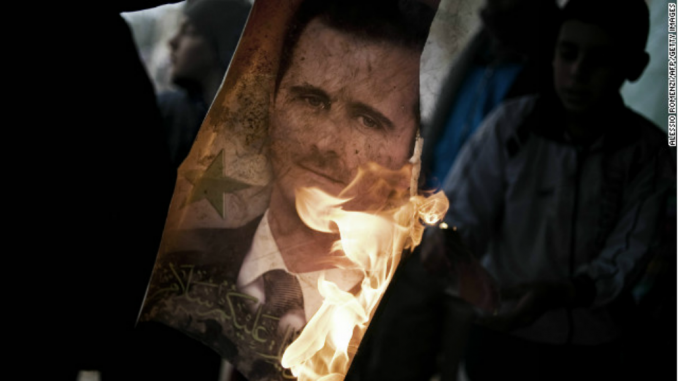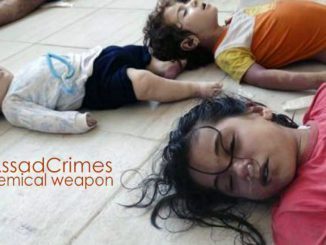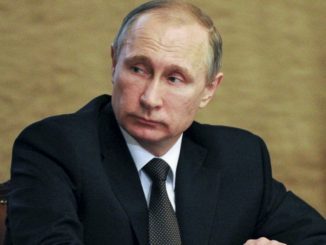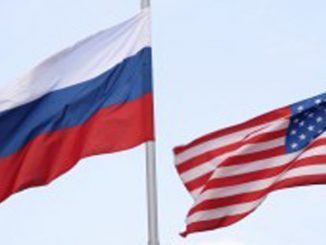
Foreign ministers from Group of Seven (G7) failed to reach an agreement about the British proposal on sanctions against Russia for backing Assad who is primal accused in a deadly chemical attack that happened last week in Syria.
More than 60 civilians were killed in Syria in a new chemical attack carried out by Assad regime’s air force on the rebel-held Idlib province last week.
Medical sources said that more than 300 other civilians were injured in this attack, and many of them were transferred to hospitals near the Turkish borders or inside Turkey, where poison tests were made.
In a sharp escalation of the U.S. military role in Syria, two U.S. warships fired dozens of cruise missiles from the eastern Mediterranean Sea at the airbase controlled by Assad regime forces from which the attack as carried out.
Trump ordered the strikes just a day after he pointed the finger at Assad for this week’s chemical attack.
“Tonight I ordered a targeted military strike on the airfield in Syria from where the chemical attack was launched.”
“Years of previous attempts at changing Assad’s behavior have all failed and failed very dramatically,” Trump said on Thursday.
Russia condemned the strikes, saying Washington’s action would “inflict major damage on US-Russia ties”, according to Russian news agencies.
But the US allies backed this move, calling for more pressure on Assad regime and blaming Russia for backing Assad accusing Putin of taking part in killing the Syrian civilians.
Calling for sanctions on Russia
Foreign ministers of the G7 nations were planning to seek to pressure Russia to distance itself from Syrian President Bashar al-Assad.
British Foreign Secretary Boris Johnson urged Putin to abandon Assad, amid evidence that the Syrian president had used chemical weapons.
“Vladimir Putin is “toxifying the image of Russia” by backing Bashar al-Assad and the G7 must consider fresh sanctions against Russia and Syria in response to last week’s chemical attack on civilians,” Boris Johnson has said.
“I think the Russians need a way out and a way forward,” Johnson told the BBC in Italy. “If you think about the position of Vladimir Putin now, he’s toxifying the reputation of Russia by his continuing association with a government which has flagrantly poisoned its own people”.
He called on Moscow to do “everything possible to bring about a political settlement in Syria and work with the rest of the international community to ensure that the shocking events of the last week are never repeated”.
The French foreign minister, Jean-Marc Ayrault, made the same linkage on the sidelines of the summit, saying “the fight against terrorism cannot be effective if we do not link it to resolving the Syrian situation”.
US Secretary of State Rex Tillerson has strongly criticized Russia for failing to prevent Syria from carrying out the chemical attack on the rebel-held town of Khan Sheikhoun last Wednesday that left 89 people dead.
But also said there had been “no change to our military posture” in Syria following a retaliatory US strike against a Syrian airbase, and that Washington’s “first priority” in Syria was to defeat so-called Islamic State (ISIS).
No sanctions on Russia, but cooperation
Johnson had hoped for some form of explicit support, but the final G7 communique does not mention sanctions in the second day of the meeting.
Italy, which hosted the G7 gathering in Tuscany, said the idea did not win broad support. “There is no consensus at this time for new sanctions as an efficient method to reach our goal,” Foreign Minister Angelino Alfano told reporters.
“There are obviously different opinions, and I am referring to my colleague Boris Johnson, who raised the issue,” he said, adding: “The position of the G7 is very clear. We support the sanctions that have already been introduced.”
Italian officials estimate that sanctions imposed on Russia after its 2014 annexation of Crimea have cost Italy some four billion euros in lost business, and Rome has pushed back on previous attempts to impose fresh penalties on Moscow.
Alfano said the G7 did not want to put Russia in a corner, but rather sought a constructive relationship with Moscow.
“We think the Russians have the leverage that is needed to put pressure on [President Bashar al-Assad] and to get him to observe the commitments with regard to the ceasefire,” he said.
French Foreign Minister Jean-Marc Ayrault suggested the question was given little attention by Johnson’s counterparts from the United States, Germany, Canada, Italy, France and Japan. “The question wasn’t mentioned by anyone, except Boris Johnson, but we didn’t talk about it any further,” Ayrault said.
However, speaking later to British television, Johnson said there had been an agreement on support for further sanctions if evidence can be gathered against those involved in last week’s poison gas attack on a rebel Syrian town that killed 87 people.
Johnson said Britain and its European partners would await the outcome of an investigation by the Organization for the Prohibition of Chemical Weapons (OPCW).
“There was a very wide measure of agreement last night that … if we can show complicity by those Russian officers who are helping the Syrian military operation, then they should also be sanctionable as well,” he told the BBC.
Johnson also said there was no evidence that Russia knew of plans for a gas attack.
“Did they know that Assad was going to unleash chemical weapons? We have no evidence for that, we don’t know whether the Russians were involved at all,” Johnson told Sky News.
“It may very well be that they (Russia) have simply been betrayed by their client, by the guy they have been backing.”
The Syrian crisis began as a peaceful demonstration against the injustice in Syria. Assad regime used to fire power and violence against the civilians and led to armed resistance. 450.000 Syrians lost their lives in the past five years according to UN estimates, and more than 12 million have lost their homes.



